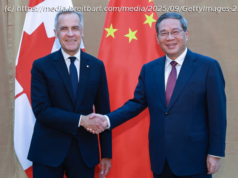 As President Donald Trump wages a public and bellicose battle with the Mexican government, China may emerge as the victor.
As President Donald Trump wages a public and bellicose battle with the Mexican government, China may emerge as the victor.
The world’s number-two economy is closely watching as Trump threatens to renegotiate the North American Free Trade Agreement and presses Mexican President Enrique Peña Nieto to finance construction of a border wall. The Mexican economy, already facing a slowdown, could deteriorate further under both scenarios. Either way, strategists widely agree Mexico will look to reduce dependence on its largest trading partner, and Beijing is likely to emerge as a contender to replace the void left by Washington.
«Like other countries worried about the uncertainties of a Trump administration, Mexico will look to deepen engagement with China,» said Shawlin Chaw, senior analyst at Control Risks. «The mainland is a natural choice due to its economic power and in return, Beijing will able to increase the international market for Chinese exports and diversify its sources of raw materials. »
From investments in Africa to South America, Bejing has been carefully extending its sphere of influence in regions well outside its backyard as it looks to cement status as a global superpower. A number of U. S. allies have expressed concern over the apparently isolation-prone Trump administration, and China is looking to exploit that dynamic. Chinese President Xi Jinping emphasized that point at the World Economic Forum in Davos last month, saying his country was ready to take on a leadership role in international trade.
«China will certainly fill up the American vacuum in Mexico,» said Jonathan Bogais, adjunct associate professor, at the University of Sydney. Peña Nieto’s other options include the European Union and Japan, but Bejing is the most obvious choice, he added.
Aside from the natural economic attraction, China and Mexico were also early targets of Trump during his election campaign, reflected by his promises of constructing a U. S.-Mexican border wall and labeling Beijing a currency manipulator .
Yet despite that connection, increasing economic engagement won’t be easy, experts said. Both countries rely heavily on manufacturing, so new trade will require careful negotiation to avoid overlap.
«It is unlikely that Mexico would be able to integrate itself into Asian supply-chains,» said Josef Jelinek, senior China analyst at Frontier Strategy Group. «Given the extent of Chinese protectionism and economic nationalism, Mexico would likely be seen as more of a competitor than as a complimentary partner by China. In addition, Mexico would be at a cost disadvantage with regards to transshipments, being cheaper and easier to ship within region. »
One possible compromise could be Chinese investment into Mexico, particularly in infrastructure, in return for Mexican exports into China-controlled markets, suggested Bogais.
Also hindering further economic partnerships is the fact that Beijing is limiting outbound investment in order to control capital flight spurred by heavily leveraged state-owned enterprises and local governments, according to Chong Ja Ian, a political science professor at the National University of Singapore.
Moreover, Chinese investment overseas has a mixed track record, especially in countries like Nicaragua and Venezuela. Chong said that history could make Beijing more cautious about further investment in Latin America.






